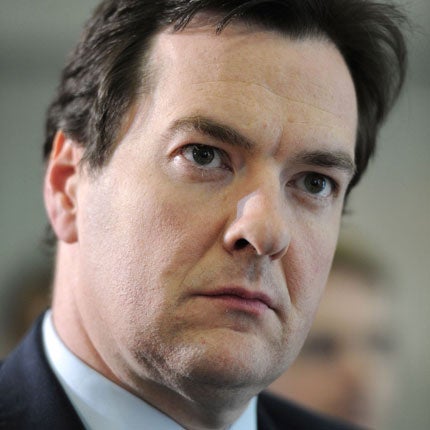UK 'not bailing out Greece again', says George Osborne

Your support helps us to tell the story
As your White House correspondent, I ask the tough questions and seek the answers that matter.
Your support enables me to be in the room, pressing for transparency and accountability. Without your contributions, we wouldn't have the resources to challenge those in power.
Your donation makes it possible for us to keep doing this important work, keeping you informed every step of the way to the November election

Andrew Feinberg
White House Correspondent
Britain has not been asked to take part in any new European Union bailout of Greece, Downing Street said today.
Chancellor George Osborne will make clear at a meeting of EU finance ministers in Luxembourg today that the UK does not want to be part of any new aid package for the Greek economy.
Downing Street said proposals drawn up last night by the 17 eurozone countries do not involve Britain.
Prime Minister David Cameron's official spokesman told reporters: "There is no proposal on the table which would involve us. The arrangements in place for Greece are arrangements that involved eurozone countries, and we weren't involved in those arrangements."
Asked if any specific request for help was directed to the UK, the spokesman replied: "No there hasn't."
Mr Cameron will discuss the Athens situation with European Commission president Jose Manuel Barroso at a meeting at 10 Downing Street this afternoon but is not expected to make any offer of help.
The issue is also expected to be raised at Thursday's European Council summit in Brussels, when all 27 EU members will look at the bloc budget for the coming years.
Britain's only potential contribution to bailing out Greece again now comes from its shareholding in the IMF, in the form of loan guarantees which would only be called in if Greece defaults.
The UK did not contribute to the original 110 billion euro (£96.5 billion) deal a year ago, put together by eurozone countries to help save one of their own.
With the slow pace of deficit reduction in Greece and the economic crisis far worse than even pessimists feared, a second bailout is now considered inevitable. Some observers predict default.
London mayor Boris Johnson said this morning that Greece should be allowed to default on its debt and leave the euro. Writing in the Daily Telegraph newspaper, Mr Johnson insisted membership of the single currency had "exacerbated" Greece's woes.
Germany and France have signalled that there is no reason for London to pay a share of a repeat bailout, likely to be finalised within weeks and for a similar sum as the first.
At today's talks in Luxembourg, Mr Osborne is expected to say that the issue is one for the eurozone alone.
Foreign Secretary William Hague is also in Luxembourg at a separate meeting of EU foreign ministers.
Before today's meeting Chief Secretary to the Treasury Danny Alexander set out the UK argument on Sky News.
He said: "It's the eurozone that is taking forward discussions now about the next stage of dealing with Greece's substantial problems. There's simply no proposition on the table for the UK to contribute beyond International Monetary Fund involvement, and I don't expect there to be one."
A bailout fund was set up by the EU, in the wake of the crisis in Greece, to finance future economic problems in the member states, and it involves all 27 members.
In theory, if a majority of the 27 vote to use the fund for a second aid package for Greece, rather than repeat a eurozone-only rescue, the UK Treasury would be responsible for 12% of the new loan guarantee to the Greek government.
Last night Greek prime minister George Papandreou insisted his country would not default and that he was determined to reduce its mounting deficit. Failure to do so would be a "catastrophe".
Mr Papandreou faces a confidence vote in the Greek parliament tomorrow. He looks set to survive but must then win support for tougher austerity measures than those which have already sparked riots in the streets and which have failed to revive the economy.
The talks on a second bailout follow approval last night of the latest slice of aid from the first bailout: a £12 billion-euro (£10 billion) handout to stave off Greece's bankruptcy.
A final decision on the second bailout, and how it will be funded, is expected next month.
Europe's economic affairs commissioner Olli Rehn said today's meeting will outline "the contents and conditions of a successor programme for Greece, with a view to taking decisions at the next meeting on July 11".
Financial Secretary to the Treasury Mark Hoban will answer an urgent question on the latest developments in Greece, tabled by Labour MP Gisela Stuart, in the House of Commons this afternoon.
Subscribe to Independent Premium to bookmark this article
Want to bookmark your favourite articles and stories to read or reference later? Start your Independent Premium subscription today.
Join our commenting forum
Join thought-provoking conversations, follow other Independent readers and see their replies
Comments